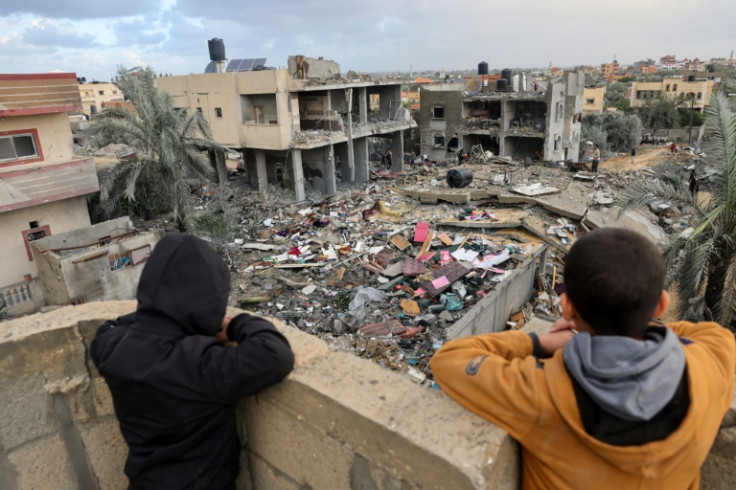UK Under Pressure To Call Out Israel's War on Hamas As Genocide After Myanmar Action
Five Western countries including the UK have legally supported claims of genocide against Myanmar at the International Court of Justice but refuses to call out Israel's war on Hamas.

The UK government's action of submitting detailed legal arguments at the International Court of Justice (ICJ) in support of genocide claims against the Myanmar government has come under fire amidst the Gaza Strip situation.
Britain is being accused of double standards, as the UK didn't press for similar charges against the Netanyahu government in the wake of the ongoing Israel-Hamas war. Political experts have called out the UK for its "wholly disingenuous" stance against Myanmar.
Six weeks ago, Britain submitted a 21-page "declaration of intervention" supporting claims that Myanmar has committed genocide against the Rohingya ethnic group, alleging mass mistreatment of children and depriving people of food and shelter.
Meanwhile, South Africa has brought a claim of genocidal intent against Israel which the Israeli diplomats have been instructed to fight by building international opposition. Israel has asked its diplomats to point out how an adverse ruling "could have significant potential implications that are not only in the legal world but have practical bilateral, multilateral, economic and security ramifications".
Israel is likely to defend genocide accusations in the ICJ citing a lack of genocidal intent. Israel has said it wants to protect the Palestinians and has killed civilians in an attempt to destroy Hamas. Israel also revealed that its post-war plans include establishing a Palestinian-led government in Gaza which shows its non-genocidal intent.
The Netanyahu government is also distancing itself from harsh remarks made by Israeli ministers and politicians regarding displacing Palestinians from Gaza.
This comes at a time when an Israeli Army report revealed that Israel planned to displace Palestinians to the Sinai peninsula in Egypt in the first week of the war on Hamas.
Although Britain isn't supporting South Africa's claim, it underlined that there is a genocide risk along the Gaza Strip in the ongoing war against Hamas by Israel.
A wider approach to genocide?
According to the document submitted to the International Court of Justice, Myanmar fits the lower threshold of genocide defining yardstick as it is mostly directed towards children instead of adults.
This comes at a time when a recent report showed how the war in Gaza could further escalate trauma in Palestinian children as nearly 50 percent of them already have suicidal thoughts.
The document further underlined what falls under the purview of genocide including systematic forced displacement from homes, imposition of particular diets and deprivation of medical services. It asks the court to determine the case of genocide based on the pattern of conduct and factual evidence not on statements and figures of people killed.
Speaking about the matter, the head of international law at Bindmans, Tayab Ali said the move shows the UK applying a wider application of genocide definition instead of a narrow one. The UK has asked the court to consider risks to life after the ceasefire, including the inability to live in homes and disabilities.
"It would be wholly disingenuous if the UK, six weeks after advancing such a significant and broad definition of genocide in the case of Myanmar, now adopts a narrow one in the case of Israel," said Tayab Ali.
The UK along with the Netherlands, Germany, France, Canada and Denmark submitted the document in November in support of an application made by Gambia in November 2019 that genocidal acts have been committed by Myanmar in 2017 as they drove out 730,000 Rohingyas to Bangladesh.
Myanmar has denied the accusations many times calling UN reports on the matter "biased and flawed". The Myanmar military government said it cracked down against Rohingya rebels involved in terrorist activities in the Rakhine region.
In December 2020, the ICJ issued a legally binding order, instructing Myanmar to end the genocidal acts and give a report on the steps taken to comply with international law. Myanmar has asserted that Gambia had no right to raise the claim but the court refuted it in December 2022, making way for other countries like the UK to discuss the case on merit with legal arguments.
Human Rights groups across the world welcomed the UK intervention in the matter and many have cited its potential relevance to the situation in Gaza.
The Lloyd C Nelson professor of international law at New York University, Robert Howse, highlighted passages which could apply to Israel's action in Gaza, which include:
"A narrow construction of underlying acts of genocide obscures how killings and other underlying acts can be waged together in a coordinated strategy aimed at destroying a protected group."
"Given their ordinary meaning, the words 'physical destruction' in Article 11(c) are not limited to cases where members of the group immediately die as a result of the 'conditions of life' inflicted on the group."
"There is a lower threshold for 'serious bodily or mental harm' when the victim is a child ... acts which ... may not be regarded as contributing to the physical or biological destruction of the group when done to adults, might be regarded as meeting those thresholds when done to children."
"It is important to adopt a construction which recognises that what it means for a child to suffer 'grave and long-term disadvantage to [their] ability to lead a normal and constructive life' may be different than for an adult."
As 40 per cent of fatalities in Gaza are children this could be applied to Israel in future. At present close to 10,000 children have been killed in Israel's war against Hamas.
© Copyright IBTimes 2025. All rights reserved.






















